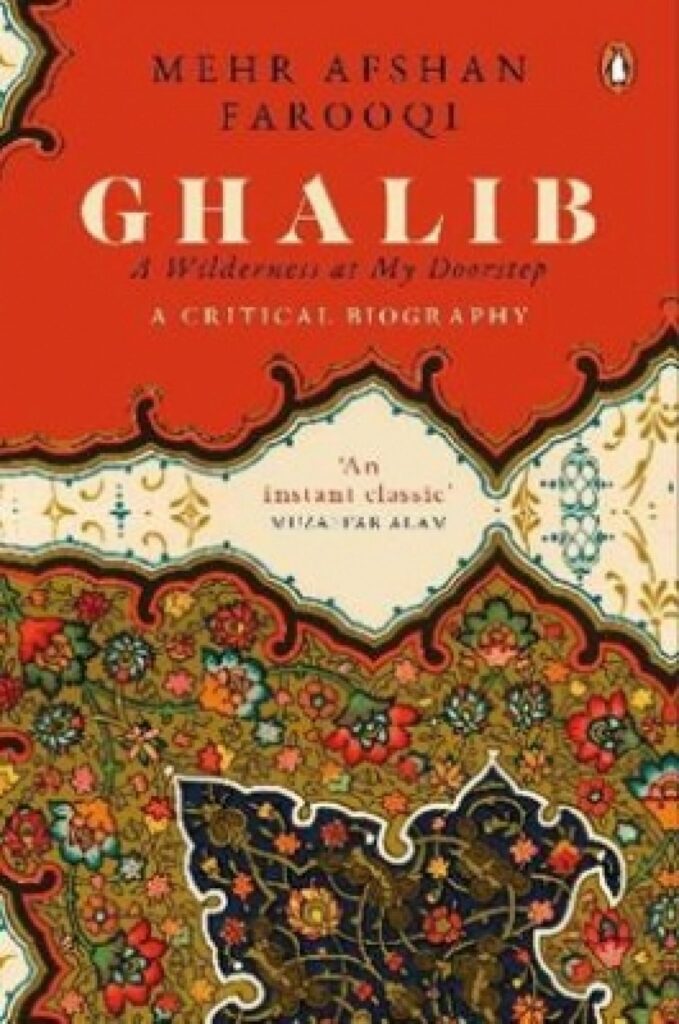
Advance Praise For The Book
An outstanding and much-needed critical biography of the greatest poet in Urdu. It is deeply scholarly, yet completely accessible, and casts a judicious but impartial eye over all the major literary battlefields surrounding Ghalib’s work in both Urdu and Persian. It brings to light many dazzling new poems and renders them into English with beautiful translations. Above all, it sends us back to Ghalib’s writing and reminds us of the delightful khushbagh that awaits any who wish to explore this lost, syncretic world of such deep profundity, wit, subtlety and beauty.- William Dalrymple
Brimming with lively translations and fresh insights into Ghalib’s life, career, and complex relationship with Urdu and Persian, Ghalib offers a deeply researched examination of the great poet’s approach to his asymmetrical oeuvre for a wider readership, and the literary-historical stakes of those decisions. Farooqi also examines the intricacies of Ghalib’s critical engagement with earlier Persian poetry, and his obsession with adhering (or his overwhelming passion to adhere) to a ‘pure’ Persian idiom in his own work. An instant classic, this book will be required reading for students of Ghalib, and for all who are interested in Urdu and Persian literary cultures more generally.- Muzaffar Alam, George V. Bobrinskoy Professor in South Asian Languages and Civilizations, the University of Chicago
We finally have a proper literary biography of Ghalib. This book tells the story of a much-loved and read poet’s life in the context of a multilingual age when courtly Mughal and nascent modern literary cultures overlapped. Farooqi’s command over the original sources and passionate engagement with the poet and his works is demonstrated on every page. In telling us the story of Ghalib’s intellectual growth, she reads his writings carefully and critically analyzes his Urdu and Persian divans, letters, introductions and afterwords, histories and commentaries on his poems. The narrative is enhanced by the inclusion of lucid translations and facsimiles of pages from manuscripts and early printed editions of Ghalib’s works. Written in an accessible manner, while being scholarly at the same time, the appearance of this book is an exciting event. Ghalib studies have now arrived at a new level and this book will become the starting point for future scholarship on the poet. – Sunil Sharma, Professor of Persianate and Comparative Literature, Boston University
The most definitive, authoritative and comprehensive biography of Ghalib till date. It explores his life, work, philosophy and opens a window of many shades of India and the subcontinent’s cultural and literary traditions.
About The Book
Mirza Asadullah Khan Ghalib was born in Agra in the closing years of the eighteenth century. A precocious child, he began composing verses at an early age and gained recognition while he was still very young. He wrote in both Urdu and Persian and was also a great prose stylist. He was a careful, even strict, editor of his work who took to publishing long before his peers. His predilection for writing difficult, obscure poetry peppered with complex metaphors produced a unique commentarial tradition that did not extend beyond his work. Commentaries on his current Urdu divan have produced a field of critical writing that eventually lead to the crafting of a critical lens with which to view the classical ghazal.
The nineteenth century was the height of European colonialism. British colonialism in India produced definitive changes in the ways literature was produced, circulated and consumed. Ghalib responded to the cultural challenge with a far-sightedness that was commendable. His imagination sought engagement with a wider community of readers. His deliberate switch to composing in Persian shows that he wanted his works to reach beyond political boundaries and linguistic barriers.
Ghalib’s poetic trajectory begins from Urdu, then moves to composing almost entirely in Persian and finally swings back to Urdu. It is nearly as complex as his poetry. However, his poetic output in Persian is far more than what he wrote in Urdu. More important is that he gave precedence to Persian over Urdu. Ghalib’s voice presents us with a double bind, a linguistic paradox. Exploring his life, works and philosophy, this authoritative critical biography of Ghalib opens a window to many shades of India and the subcontinent’s cultural and literary tradition.
About the Author
Mehr Afshan Farooqi grew up in Allahabad, India. A multiple gold medalist from Allahabad University, Farooqi is currently associate professor of Urdu and South Asian Literature at the University of Virginia. Her research publications address complex issues of Urdu literary culture particularly in the context of modernity. She is interested in bilingualism and how it impacts creativity. A well-known translator, anthologist and columnist, she is the editor of the pioneering two-volume work The Oxford India Anthology of Modern Urdu Literature (Oxford University Press, 2008).
More recently, she has published the acclaimed monograph The Postcolonial Mind: Urdu Culture, Islam and Modernity in Muhammad Hasan Askari (Palgrave and Oxford University Press, 2013). Farooqi also writes a featured column on Urdu literature of the past and present in the Dawn.
Releasing on 18th January 2021
HB | 799| 416
[the_ad id=’22722′]


















